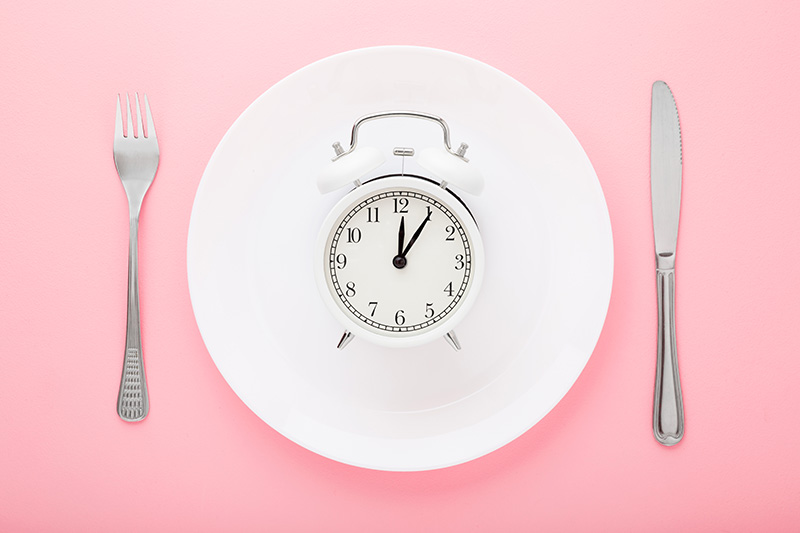More Health and Nutrition Bites
Related
Intermittent fasting plus calorie restriction equals...
We've reported on quite a few studies looking at the idea of time restricted eating (also called intermittent fasting) as a weight loss strategy. So far the evidence shows that there's no significant difference in the amount of weight lost between cutting calories overall versus intermittent fasting.
Intermittent Fasting Revisited
We've written several times about different studies assessing the idea of Intermittent Fasting (IF) for weight loss. In 2018 we shared with you a study that compared Intermittent Calorie Restriction (ICR) (essentially a 5:2 diet) with Continuous Calorie Restriction (what we think of as "dieting") and a control group doing neither but receiving dietary counseling.
Sleep time and obesity
In 2006 we shared with you a study that looked at the relationship between sleep time and Body Mass Index, which found that those who slept less than 6 hours per night were far more likely to be clinically obese than those who slept 9 hours or more.
Health & Nutrition Bites
Get the latest health and diet news - along with what you can do about it - sent to your Inbox once a week. Get Dr. Gourmet's Health and Nutrition Bites sent to you via email. Sign up now!
When you eat might matter more than previously thought

It's one of those diet myths that pop up now and again: the idea that eating after a certain time in the evening will somehow affect your efforts to lose weight. Just how this is supposed to work is unclear. This is not intermittent fasting, but rather a long-standing idea, based on no particular science, that says that eating too close to sleeptime somehow affects your metabolism.
Until now this would be dismissed. Most often explanations for avoiding eating late in the evening or just before bed would suppose that eating late meant consuming more calories than needed - leading to weight gain. Yet as we've seen recently, the idea of "a calorie is a calorie is a calorie" and that "eat less, exercise more" is the gold standard for weight loss are not nearly the hard and fast rules we believed they were.
Today we'd like to share with you an article published in Cell Metabolism recently that actually tests the "myth" (2022 Oct 4;34(10):1486-1498.e7).
The authors theorized that this idea that eating later might mean one or more things: first, that people might be hungrier when they ate later in the day, possibly leading to consuming more calories than needed; second, that they might be burning fewer calories overall due to this reduced caloric intake earlier in the day; or third, that eating later in the day might have an effect on the genetic and metabolic processes that affect fat-burning.
The authors recruited 16 men and women who were clinically overweight or obese to participate in their study. Each participant spent 2 full days in the lab: one day eating their meals at about 9am, 1pm, and 5:30pm; and another day eating their meals starting at 1pm, then at 5:30pm and 9:30pm.
These lab visits were separated by at least 3 and as many as 12 weeks. Just prior to each lab visit the participant followed their usual diet and a regular sleep-wake schedule for 2 weeks, in which they were instructed to go to bed at midnight and arise at 8am.
While in the lab, the participants were served healthy meals designed - at least at the calorie level - to maintain their current body weight.
On both lab days the authors performed a battery of tests on the subjects, from surveying perceived levels of hunger, to blood tests of the hormones most strongly associated with hunger, and even biopsies of body fat (in almost half of the participants) to assess gene expressions affecting fat burning.
The authors found that eating meals later meant it was twice as likely for the participants to feel hungry at meals - and this perceived level of hunger was measured 18 times per each lab day.
At every hour in the lab the participants' blood was tested for levels of leptin (which promotes satiety - tells you to stop eating) and ghrelin (which promotes hunger - tells you to eat). Eating meals later in the day meant leptin levels were lower overall: people were less likely to feel satisfied and stop eating. The ratio of ghrelin to leptin, which is strongly related to perceived levels of hunger, was also increased.
On 12 occasions on every lab day the authors used sophisticated methods to measure the number of calories the participants were burning, finding that those who ate their meals later in the day were burning about 5% fewer calories per day than they did when they ate earlier.
Finally, analysis of the fat samples showed that those genes involved in breaking down fat were less active and those contributing to fat storage were more active in those consuming their meals later.
What this means for you
Studies such as these, with full days in the lab as well as multiple surveys of hunger perception, multiple blood tests, and multiple biopsies, are extremely expensive to perform. Doing all of these tests for a study including more than a comparatively few people - in this case, 16 - is just not economically feasible.
The results, however, are strong. Those multiple tests and the randomized, crossover design lend weight to the results. Note that these results are predicated on the participants going to bed at midnight and rising at 8am, and your personal circadian rhythm may differ: perhaps you go to bed at 9 and get up at 6, or go to bed at 2am and get up at 10am. You might consider the timing of your regular meals and adjust for your sleep/wake cycle accordingly.
October 19, 2022
